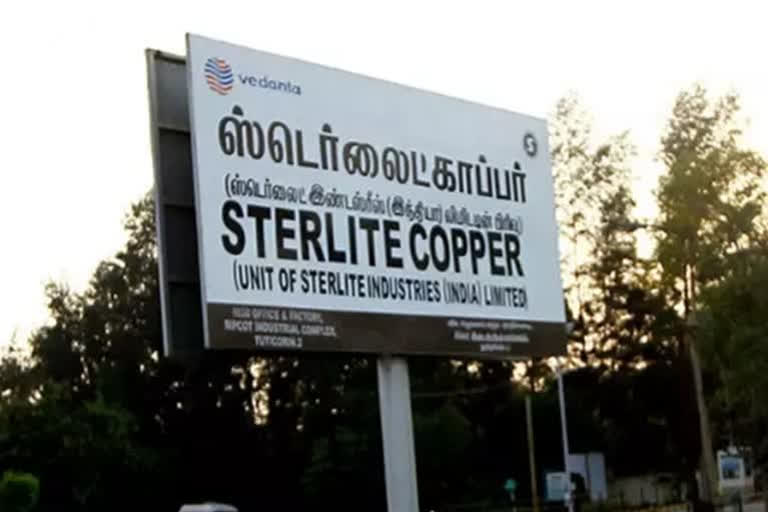Chennai (Tamil Nadu): At a time when official records show that oxygen produced at the Sterlite Copper Smelter Plant in Thoothukudi, has been far less than the quantity committed by the company in the Supreme Court, the Plant has again applied to the Tamil Nadu government seeking a six-month extension to continue production, triggering vehement opposition from locals as well as anti-Sterlite activists.
In an application to the Chief Minister's special cell on Monday, the Vedanta-owned firm has requested that it be allowed to carry out production. This comes in the backdrop of permission for the plant expiring on July 31. Available data shows that the plant has not been able to produce what it has agreed to in the Supreme Court, on the basis of which it was allowed to reopen to produce oxygen on a stand-alone basis.
As per the Supreme Court order, the company should manufacture 1050 metric tonnes of oxygen per day. However, the company's reports show that the plant, since its opening on May 13 till July 20, has produced only 2059.39 Metric Tonnes of liquid oxygen, far less than what the company has committed to supply. The Supreme Court permitted the plant to reopen on April 27 for producing oxygen to meet the national crisis. On May 13, it first transported 35 MT of oxygen to the state. Subsequently, there was a technical issue in the plant, halting operations till May 19. With hardly 10 days left for the plant to stop production, questions have been raised as to how the plant would install the required machinery and manage to produce the quantum agreed upon. Vedanta had supplied a meagre fraction of less than 10 percent, wasting 90 percent due to the absence of required machinery to liquify gaseous O2.
Also read: Operation beyond permissible duration not acceptable, say anti-Sterlite protestors
According to informed sources, between May 13 and July 08, Vedanta produced 14,675 tonnes of oxygen but supplied only 1639 tonnes of medical grade oxygen. More than 13,000 tonnes of oxygen was wasted by discharging into the atmosphere.
Meanwhile, anti-Sterlite protestors have been pressing for the closure of the plant by the July 31 deadline. In their view, any extension would fuel apprehension among the people. In the aftermath of the police firing, Sterlite has become a moral issue among the locals.
"It is true that the state had experienced an O2 shortage for Covid patients during the initial weeks of the second wave. Then, the apex Court and Tamil Nadu government allowed the plant to produce oxygen to meet the scarcity. However, things have improved far better in the state and today there is a surplus to meet any exigency. Even the state has enough oxygen from different sources," Henri Tiphagne, Executive Director of People's Watch and human rights defender, told ETV Bharat. Considering this, the plant should be closed on the day stipulated by the Court. However, the plant can produce oxygen in various units, but not in Thoothukudi, he added.
Echoing the same, environmental activist Professor Fatima Babu alleged that after the plant started producing oxygen, the electricity consumption seemed to have skyrocketed. "It is learnt that 1,32,48000 units of power were consumed in the last two months in the production of oxygen. A rough calculation may lead to nearly 9000 plus units for a single tonne of oxygen produced. This has led to power outages not only in Thoothukudi but also across the state," explained Fatima. She has written to Thoothukudi MP, Kanimozhi, seeking suspension of the production at the Vedanta unit.
Also read: Sterlite plant develops 'technical snag'; O2 production halted
"Oxygen is manufactured more efficiently by others. In the event of a third wave and increased oxygen needs, the plant can be moved from standby to production mode without delay", she had mentioned in the letter.
It may be recalled that when people from Thoothukudi and nearby villages took out a rally in May 2018, seeking closure over environmental issues, police opened fire killing 13 protestors on the spot.



